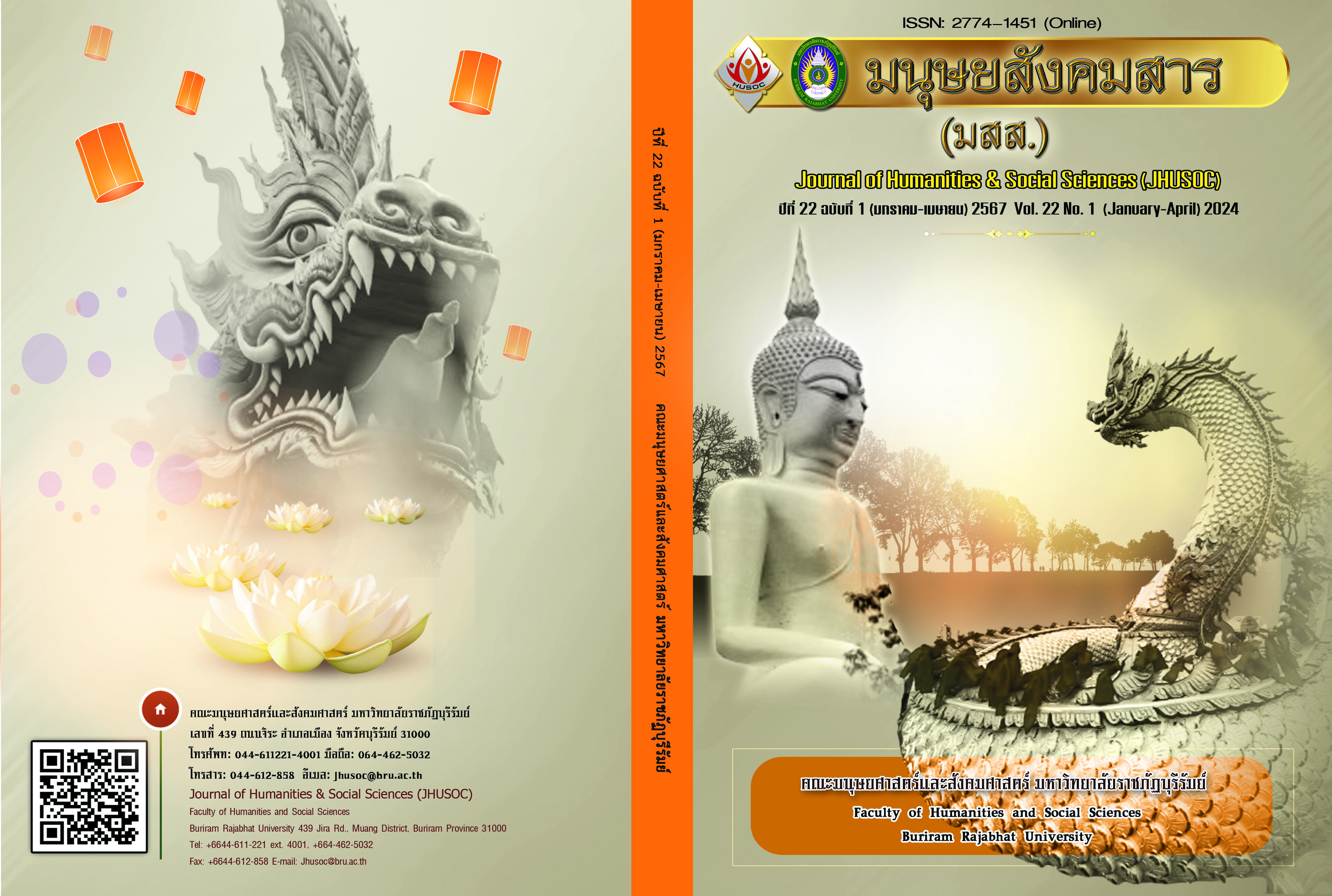แนวทางการจัดการปัญหาขยะในพื้นที่มหาวิทยาลัยมหาสารคามและชุมชนใกล้ชิดมหาวิทยาลัยมหาสารคาม
Main Article Content
บทคัดย่อ
การวิจัยครั้งนี้มีวัตถุประสงค์เพื่อศึกษาแนวทางการจัดการขยะบริเวณพื้นที่มหาวิทยาลัยและชุมชนใกล้เคียง โดยชุมชนใกล้เคียงคือตำบลขามเรียง และตำบลท่าขอนยาง กลุ่มเป้าหมาย คือ ตัวแทนผู้นำชุมชน ประชาชน บริษัทห้างร้าน องค์กรปกครองส่วนท้องถิ่น นิสิต และอาจารย์ จำนวน 30 คน เครื่องมือคือ การสำรวจด้วยระบบ GIS การสัมภาษณ์ การสังเกต และการสนทนากลุ่ม ผลการวิจัยพบว่าแนวทางการแก้ไขปัญหาขยะคือ 1) การสร้างพื้นที่ให้ผู้มีส่วนได้ส่วนเสียมีโอกาสได้จัดการปัญหาร่วมกันด้วยการบูรณาการความร่วมมือจากองค์กรที่เกี่ยวข้อง 2) การใช้นวัตกรรมทางเทคโนโลยีระบบสารสนเทศภูมิศาสตร์ (GIS) มาช่วยในการจำแนกพื้นที่ปัญหาขยะ ปริมาณขยะ และระดับของปัญหาขยะในแต่ละโซนได้อย่างชัดเจน 3) การบูรณาการความร่วมมือในการจัดเก็บภาษีก้าวหน้าที่สัมพันธ์กับปริมาณขยะของแต่ละลักษณะกลุ่มอาคาร 4) การออกเทศบัญญัติการจัดการขยะที่สัมพันธ์กับบริบทปัญหา 5) การออกแบบการจัดการขยะร่วมกันในพื้นที่ทับซ้อน และ 6) การสร้างกระบวนการแปรรูปขยะให้เป็นปุ๋ยอินทรีย์โดยมีมหาวิทยาลัยเป็นต้นแบบ
Article Details

อนุญาตภายใต้เงื่อนไข Creative Commons Attribution-NonCommercial 4.0 International License.
เนื้อหาและข้อมูลในบทความที่ลงตีพิมพ์ในวารสารทดสอบระบบ ThaiJo2 ถือเป็นข้อคิดเห็นและความรับผิดชอบของผู้เขียนบทความโดยตรงซึ่งกองบรรณาธิการวารสาร ไม่จำเป็นต้องเห็นด้วย หรือร่วมรับผิดชอบใดๆ
บทความ ข้อมูล เนื้อหา รูปภาพ ฯลฯ ที่ได้รับการตีพิมพ์ในวารสารทดสอบระบบ ThaiJo2 ถือเป็นลิขสิทธิ์ของวารสารทดสอบระบบ ThaiJo2 หากบุคคลหรือหน่วยงานใดต้องการนำทั้งหมดหรือส่วนหนึ่งส่วนใดไปเผยแพร่ต่อหรือเพื่อกระทำการใดๆ จะต้องได้รับอนุญาตเป็นลายลักอักษรจากวารสารทดสอบระบบ ThaiJo2 ก่อนเท่านั้น
เอกสารอ้างอิง
Aj-Sri, L. & Sripokhangkul, S. (2017). Sold waste management in Mueng Mahasarakham municipality Mahasarakham Province. Journal of MCU Social Science Review, 6(2-05), 25–36. [ in Thai]
Baipho, W. (2013). Social and social impacts on the community. From the solid waste management project Fully integrated, central zone Ban Pa Song Noi Doi Saket District Chiang Mai Province. Chiang Mai Rajabhat Research Journal, 14 (2), 61-71. [in Thai]
Camarillo, M. E., & Bellotindos, L. M. (2021). A study of policy implementation and Community Participation in the Municipal Solid Waste Management in the Philippines. Applied Environmental Research, 43(2), 30–45. https://doi.org/10.35762/AER.2021.43.2.3
Chaisorn, W., & Kasapradit, B. (2017). Social responsibility of business organizations and Sustainable development: Case study of social responsibility of 6 companies. Panyapiwat Journal, 9(3), 140-152. [in Thai]
Chaithongrat, T., Kotdee, M., & Sawangsri, P. (2019). Community waste management project. Participate in Khon Yang Subdistrict Municipality and Kham Riang Subdistrict Municipality. Kantharawichai District Maha Sarakham Province Case study of community areas surrounding the entrance to Maha Sarakham University [research report]. Mahasarakham University. [in Thai]
Chaiyarit, J., & Intarasaksit, P. (2021). Factors Influencing Appropriate Management Of Household Waste in Developing Country. Asia-Pacific Journal of Science and Technology, 26(1), 1-7.
Kraisornsuthasinee, S. (2013). Responsibility of business to society. Plan Printing. [in Thai]
Jaisue, D. (2017). Garbage situation and waste management at source in the community. Wapi Pathum District Maha Sarakham Province. Maha Sarakham Hospital Journal, 14(3), 38-46. [in Thai]
Jinaboonruang, S. (2022). Driving business with the concept of economic development BCG Economy Case study: Limited Partnership Doi Tung Grains. Academic journal Phranakhon Rajabhat University, 13(2), 48-65. [in Thai]
Maiman, T., Thongmark, C., Rattanatai, B., & Rojanadilok, T. (2023). BCG economic model for balanced and sustainable development. journal Eastern Asia University Social Sciences and Humanities Edition, 13(2), 14-27. [in Thai]
National Science and Technology Development Agency. (n.d.). BCG Model: Fostering Sustainable Development in Thai Economy. https://www.nstda.or.th/en/images/pdf/BCG_Booklet1.pdf
Noonin, S. (2023). Motivating Achievement of Sustainable Development Goals by Implementing Corporate Social Responsibility. Executive Journal, 43(1), 99-113.
Pawanna, C. (2020). Report summarizing the results of the survey and analysis of waste components. Building and Facilities Division: Mahasarakham University. [in Thai]
Pawanna, C. (2021). Report summarizing the results of the survey and analysis of waste components. Building and Facilities Division: Mahasarakham University. [in Thai]
Phoklang, N., Karnumarn, R., & Khamwisit, T. (2017). Household waste management through a participatory process, Ban Nongku community, Nasinuan Sub-District, Kantharawichai District, Maha Sarakham Province. Journal of Health Science, 26(2), 332-330. [ in Thai]
Phuchinda, V. (2012). Models in industrial environmental management. Using philosophy sufficiency economy national. Institute of Development Administration. [in Thai]
Pollution Control Department. (2018). Thailand's roadmap on plastic waste management 2018 -. 2030. https://www.pcd.go.th/wp-content/uploads/2020/05/pcdnew-2020-05-27_06-47-53_174751.pdf [in Thai]
Promkham. T. (2020). Study of the problem of solid waste management in Phetchabun Municipality. Phetchabun Province. Community Research Journal, 14(4), 52-62. [in Thai]
Phoochinda, W. (2012). The Consistency of the Principles of Eco-friendly Industrial Estates with the Sufficiency Economy. Journal of Environmental Management, 3(1), 1-14. [in Thai]
Satitmannaitham, B. (2023). A participatory management approach to sustainable waste management. Interdisciplinary Academic and Research Journal, 3 (6), 269-286. DOI: https://doi.org/10.60027/iarj.2023.271450 [in Thai]
Tippinit, K. (2019). Application of sufficiency economy philosophy in environmental management: IRPC public company limited case study. Master of Science [Environmental Management], National Institute of Development Administration. [in Thai]
Sawetrattanakul, S., Narrat J. S., Tantranont, N., & Setthapun, W. (2022). Attitudes, behaviors and information perception for waste management in community households in Kuet Chang Sub-District, Mae Taeng District, Chiang Mai Province. RES MILITARIS, 12(2), 1050–1060.
Sivaramanan, S. (2013). E-waste management, disposal, and its impacts on the environment. Universal Journal of Environmental Research and Technology, 3(5), 531-537. [in Thai]
Wasanadamrongdee, S. (2018). Assessment of Bangkok’s capacity to manage Hazardous waste from the community. Environmental Management Journal, 14(1), 40-61. [in Thai]
Zangmo, C., & Sharp, A. (2017). Solid waste generation, composition and management in Paro hotel industry. Applied Environmental Research, 39(2), 15–27. https://doi.org/10.35762/AER.2017.39.2.2
Yongvongphaiboon, L. (2023). Managing an organization with social and environmental responsibility sustainable of the steel industry in the stock exchange of Thailand. SSRU Journal of Public Administration, 6(1), 126-139.


